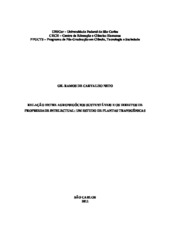| dc.contributor.author | Carvalho Neto, Gil Ramos de | |
| dc.date.accessioned | 2016-06-02T19:16:27Z | |
| dc.date.available | 2011-03-24 | |
| dc.date.available | 2016-06-02T19:16:27Z | |
| dc.date.issued | 2011-02-21 | |
| dc.identifier.citation | CARVALHO NETO, Gil Ramos de. Relationship between Sustainable Agribusiness and the Intellectual Property Rights: a study of transgenic plants. 2011. 110 f. Dissertação (Mestrado em Multidisciplinar) - Universidade Federal de São Carlos, São Carlos, 2011. | por |
| dc.identifier.uri | https://repositorio.ufscar.br/handle/ufscar/1058 | |
| dc.description.abstract | A sustainable agribusiness must be concerned with all its branches, including the production and negotiation of agricultural biotechnologies. The study of transgenic plants theme brings up several issues that affect society today in regard to environmental, economic and social sustainability. The field of CTS studies seeks public awareness of the relationship between science, technology and society, taking into account the risk society we live in, and the process of reflexive modernization which we pass through. The law must comply with its regulatory function in the area, taking into account social expectations. The promulgation, on March 24, 2005, of the Biosafety Law (Law nº 11.105/2005) that proposes to establish safety standards and enforcement mechanisms of activities involving genetically modified organisms, is an initiative towards that path. This work, which is based on the technological monitoring of transgenic plants on the basis of patents from the National Institute for Intellectual Property, from the enactment of this Act, in addiction to analyzing the regulatory mark for those technologies in order to verify the possibility of dual protection of them, through the LPI and by the system of LPC. It was identified a concentration of patent filings on behalf of foreign companies, pointing to the need of an analysis of the risks from not only the technology itself, but also the know-how of technological products arising from genetic engineering. Concerning to the legal intellectual protection, this dissertation, according to the methodology used study of laws didn´t find any gaps that would enable the double protection of transgenic plants. | eng |
| dc.description.sponsorship | Financiadora de Estudos e Projetos | |
| dc.format | application/pdf | por |
| dc.language | por | por |
| dc.publisher | Universidade Federal de São Carlos | por |
| dc.rights | Acesso Aberto | por |
| dc.subject | Desenvolvimento da ciência e tecnologia | por |
| dc.subject | Agricultura | por |
| dc.subject | Patentes | por |
| dc.subject | Biossegurança | por |
| dc.subject | Sustentabilidade | por |
| dc.subject | Propriedade intelectual | por |
| dc.subject | Agriculture | eng |
| dc.subject | Patents | eng |
| dc.subject | Biosafety | eng |
| dc.subject | Sustainability | eng |
| dc.subject | Intellectual property | eng |
| dc.title | Relação entre agronegócios sustentáveis e os direitos de propriedade intelectual: um estudo de plantas transgênicas | por |
| dc.title.alternative | Relationship between Sustainable Agribusiness and the Intellectual Property Rights: a study of transgenic plants | eng |
| dc.type | Dissertação | por |
| dc.contributor.advisor1 | Ferraz, Maria Cristina Comunian | |
| dc.contributor.advisor1Lattes | http://lattes.cnpq.br/2893153253924855 | por |
| dc.description.resumo | O agronegócio, para ser sustentável precisa ser dedicado em todos os seus ramos de atuação, inclusive na produção e comercialização de agrobiotecnologias. O estudo do tema das plantas transgênicas traz à tona diversas questões que afetam a sociedade atual no que tange à sustentabilidade ambiental, econômica e social. O campo de estudos CTS busca a tomada de consciência dos cidadãos das relações entre ciência, tecnologia e sociedade, levando em conta a sociedade de risco em que vivemos, e o processo de modernização reflexiva pela qual passamos. O Direito deve cumprir com sua função regulatória na área, atendendo aos anseios sociais. A promulgação, em 24 de março de 2005, da Lei de Biossegurança (Lei nº 11.105/2005) que se propõe a estabelecer normas de segurança e mecanismos de fiscalização de atividades que envolvam organismos geneticamente modificados, é uma iniciativa nesse caminho. Este trabalho se fundamenta no monitoramento tecnológico de plantas transgênicas na base de patentes do Instituto Nacional de Propriedade Intelectual, a partir da promulgação da referida Lei, além de analisar o marco regulatório para aquelas tecnologias, de forma a verificar a possibilidade de dupla proteção das mesmas, por meio da LPI e pelo sistema da LPC. Identificou-se uma concentração de depósitos de pedidos de patentes em nome das empresas estrangeiras, apontando para a necessidade de uma análise dos riscos advindos não só da tecnologia em si, como também do know-how tecnológico de produtos advindos da engenharia genética. No tocante à proteção jurídica intelectual, o trabalho, de acordo com a metodologia utilizada leitura de leis não encontrou lacunas que possibilitassem a dupla proteção de plantas transgênicas. | por |
| dc.publisher.country | BR | por |
| dc.publisher.initials | UFSCar | por |
| dc.publisher.program | Programa de Pós-Graduação em Ciência, Tecnologia e Sociedade - PPGCTS | por |
| dc.subject.cnpq | CIENCIAS SOCIAIS APLICADAS | por |
| dc.contributor.authorlattes | http://lattes.cnpq.br/2102767617751404 | por |
